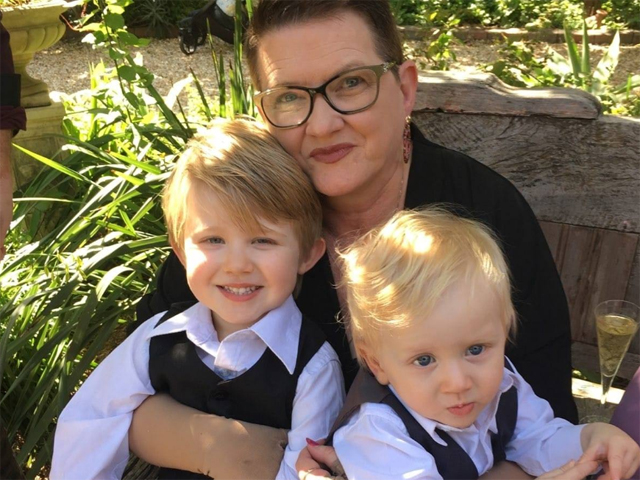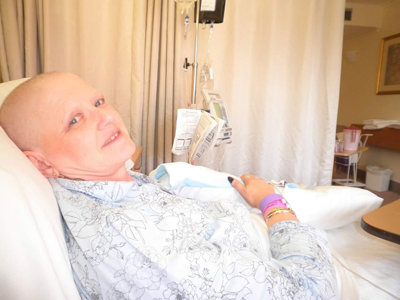Tracey Ryan National Breast Cancer Awareness Month Interview

Without research, 30,000 more lives will be lost to breast cancer by 2030
To coincide with National Breast Cancer Awareness Month, the National Breast Cancer Foundation (NBCF) has released new data showing 30,000 more lives could be lost to breast cancer by 2030, without adequate research investment.
NBCF has funded vital life-saving research into breast cancer since 1994, and the data shows that with this funding from the generous Australian community, over 44,000 lives have been saved in this time. This has been achieved through identifying new risk factors, improving early detection and creating more effective, less harsh treatment options.
The data also shows:
• A woman's risk of breast cancer is now 1 in 7, up from 1 in 8 in the last year alone
• 8 women would continue to die every day which is the 2nd highest cancer killer in Australian women
• Over 76,000 Australians would also lose a direct family member – a mother, sister, or daughter by 2030
• Australia would stand to lose over $1.868 billion in wages just through lives lost to breast cancer, this year alone
Professor Sarah Hosking, CEO of the National Breast Cancer Foundation, believes no-one should have to die from breast cancer, and that continued investment to life-saving research is the only way to change these statistics.
"This year alone nearly 20,000 Australians, both men and women, will come face to face with the disease and unfortunately more than 3,000 will lose their life. This doesn't have to be the case though; the National Breast Cancer Foundation has launched an ambitious target of zero deaths by 2030 but it is up to everyday Australians to help us achieve it," she said.
"Our target is possible but only if we continue to receive direct investment for the world-class research we fund. We are at a critical juncture whereby a future where no Australian has to lose a parent, partner, sibling or child to this devastating disease is in sight. By investing in NBCF's vision of zero deaths from breast cancer, they can support our game-changing research projects and help us achieve the target," she added.
Breast cancer is the most commonly diagnosed cancer in Australia. Its incidence is rapidly rising, with breast cancer diagnosis rates almost doubling since 1994. 1 in 7 women will be diagnosed with breast cancer in their lifetime, and 53 Australians are diagnosed with the disease each day. On average it costs Australia over $800 million per year in medical expenses to manage it.
This October, which is Breast Cancer Awareness Month, the National Breast Cancer Foundation is putting a spotlight on how the Australian community can save the 8 women who die from the disease each and every day, so that no-one has to have a world without a loved one dying from breast cancer.
NBCF will continue to invest in cutting-edge research projects to achieve zero deaths from breast cancer by 2030. We will do this by analysing large datasets across the country to identify trends and factors contributing to lower survival. We will also be funding a significant amount of research into the most aggressive breast cancer subtypes so that we can improve detection and treatment, particularly in metastatic and triple-negative breast cancers. In addition, we will conduct research to enable better health service delivery and services across Australia so that breast cancer survival is something accessible to all.
Dr Rohan Bythell-Douglas is just one of the researchers who has been funded through NBCF's research grants this year, leading a project to bring a breakthrough imaging technique to Australia for the first time to learn more about the FANCM gene. This new gene has only recently been identified as a risk factor for inherited breast cancer and Dr Bythell-Douglas and his team will use this information to investigate why the FANCM gene mutations predispose women to breast cancer. This project will likely lead to the introduction of FANCM genetic testing in clinics, boosting the quality of information for women who may have this genetic risk.
In addition, the findings may help to direct future treatment options for women with inherited breast cancer.
"A world without breast cancer deaths can only happen with the right research investment facilitated by the continued support of the Australian community," he said.
In addition, top fashion, beauty and lifestyle brands have teamed up with the National Breast Cancer Foundation during Breast Cancer Awareness month to raise additional much-needed funds for research.
Brands will donate proceeds from the sale of their special-edition pink products towards game-changing breast cancer research – research that will help to detect tumours earlier, improve treatment outcomes, and ultimately – save lives.
Australians can find out more information on 2019 pink products, by visiting: nbcf.org.au/partners/pink-products
Interview with Tracey Ryan
Question: Can you tell us about your experiences with breast cancer?
Tracey Ryan: I was diagnosed in February 2010 with Invasive Ductal Carcinoma- Estrogen positive stage 3. Very shortly afterwards, I made the decision to have a double mastectomy, in order to prevent the cancer metastasising to other parts of my body. Unfortunately, it didn't work, and the cancer is now in my spine, ribs, lung and liver.
The double mastectomy had a major effect on a number of things in my life. It was very painful, expensive, mentally scarring and had effects on my own idea of myself as a woman – and on most of my relationships. I found new and wonderful friends through my involvement in breast cancer charities and support groups, but lost some people close to me who simply couldn't handle me having this disease – especially after I was informed in 2012 that I had advanced breast cancer. In other words, 'terminal' – an expression I hate.
What preceded – and followed- my surgery was a seemingly never-ending procession of tests, medications, chemotherapy. My hair fell out more than once and there was lots of pain and lots of expense. Worst of all perhaps was the effect I saw that it had on my family. This effect is ongoing.
Surprisingly, there was a small upside. I got to meet some absolutely amazing women and their families. I have had experiences and memories that I would never have otherwise had. And, once I was diagnosed with ABC, I compiled a 'bucket list' and have pretty much done everything on it – except found a cure for cancer. That's the only item I haven't been able to tick off.
Unfortunately – and predictably - there was a downside to the upside. Some of the aforementioned amazing women I have met and loved have now passed away. It is very much a double-edged sword.
Question: What message would you like to spread during Breast Cancer Awareness Month?
Tracey Ryan: On the first of every month, please check your boobies and get your men to do it too – to themselves – men get breast cancer too.
Don't take no for an answer when your doctor tells you there's nothing wrong or it's something else – you know your body better than anyone else.
You're never too young to get breast cancer. I am part of BC support groups who have members as young as 16 years of age.
Question: How has the NBCF supported you during throughout your breast cancer experience?
Tracey Ryan: The National Breast Cancer Foundation has given me the confidence to get 'out there' and speak about myself and breast cancer. I am not a natural public speaker, but through practice – and many presentations – I have become more confident in being able to spread the message.
I have made a number of great friends through NBCF, including past and present staff – and fellow speakers. I have been able to travel, attend conferences, meetings and forums – and am continually forming new and important relationships.
I have hope that maybe, due to research grants funded by NBCF, we will be able to reach a stage where one day there will be no cancer and no deaths from it.
 Question: What advice do you have for newly diagnosed breast cancer patients?
Question: What advice do you have for newly diagnosed breast cancer patients? Tracey Ryan: Don't delay seeking professional help.
There are a lot of support groups out there – online and in person. Find one (or more) that suits your needs. There are so many incredible people out there that will want to help.
Be kind to yourself – where you can, put yourself first. Say 'no' when you can't do it (without guilt), and rest when you need to.
Below is a list of questions you should consider asking your doctor when you see him or her;
Information About the Diagnosis
What type of breast cancer do I have?
Where is this cancer located?
Has the cancer spread to other parts of my body?
Is there a possibility that it may spread in the future?
What is the cancer's current stage? How many stages are there for this type of cancer?
What does this stage of breast cancer mean for me?
Treatments
What treatment options are available?
What is the goal of each of these treatments?
Will any of these treatments slow or stop the cancer?
Which treatment(s) do you recommend and why?
How will these treatments affect my daily life as well as that of my family?
Are there any lifestyle changes I can make that will slow the cancer's progress?
Should I consider participating in a clinical trial? How can I do that?
Surgery
Do I need surgery? If so, what does that entail?
What kind of recovery should I expect after the surgery?
What kind of additional support will be available after surgery?
Doctor's Experience
What is your experience treating this type of cancer?
Do you take a conservative or aggressive approach to treating the type of cancer that I have?
Should I get a second medical opinion? How do I do that?
Prognosis
What is my overall prognosis and chance for recovery?
What should my family expect when supporting me as I deal with this disease?
Interview by Brooke Hunter
MORE



